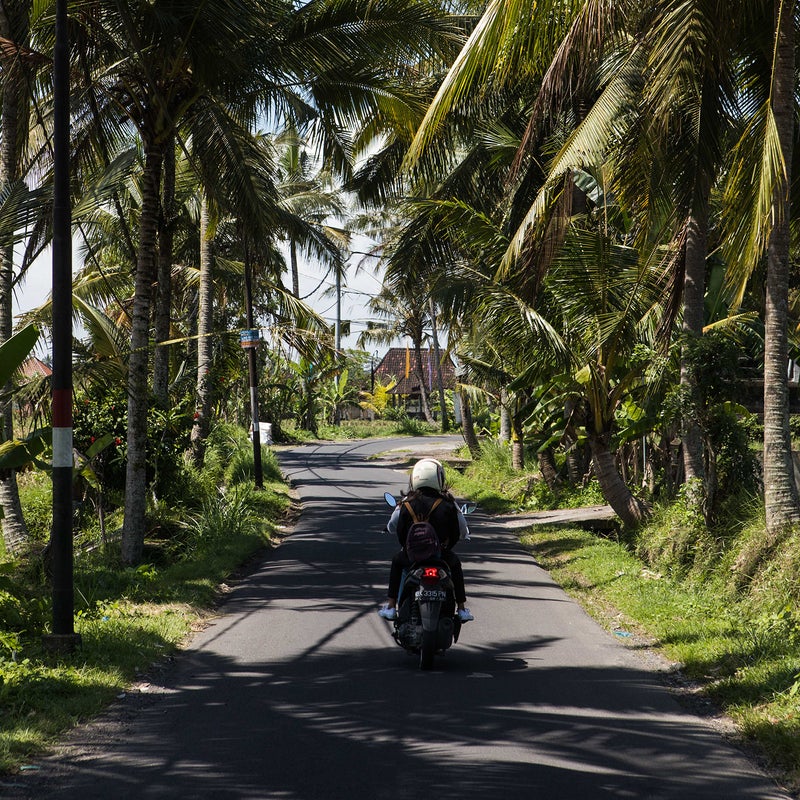Is the ‘Digital Nomad’ Life as Good as It Sounds?
Travel companies are creating a generation of digital nomads, flying gig workers and tech nerds to exotic locales where they can pursue dream jobs. These brands make it their business to solve the significant logistical problems that come up when trying to get work done while abroad—but can they solve the problem of other people?
New perk: Easily find new routes and hidden gems, upcoming running events, and more near you. Your weekly Local Running Newsletter has everything you need to lace up! .
Nia Howard, a recent college graduate from California, seems comfortable living 8,000 miles from home with a group of complete strangers, many of them old enough to be her parents. Her daily existence near Canggu, Bali, which includes hikes through rice paddies, midday swims, and lots of tropical fruit, bears little relation to her job with an American proofreading service, where she teleworks 40 hours a week, improving the spelling, grammar, and syntax of legal documents, medical papers, and scientific-journal articles. Howard isn’t crazy about the work; her ambitions are more creative. “But I’ve always been trying to find ways to avoid having an office job,” she says. Reclined on an ultrasuede couch in the middle of a luxury villa, she gives a self-aware shrug.
Download for your iPhone to listen to more longform titles.
The French doors are open, letting in the sounds of roosters, wind chimes, and neighbors shouting in Indonesian. It’s just past noon. People mill in and out of the living room and make vague plans to order lunch. Sara Pezzolesi, an Italian photographer and designer in her late thirties, fills a glass with water and adjusts her wrist brace, which I assumed was for carpal tunnel but turns out to be the result of an injury sustained while scrambling up a temple. Someone wanders in wearing swim trunks, polishes off the last of a pizza that had been sitting in the fridge for a few days, and carefully breaks down the box for recycling. Eventually, a Mexican restaurant is chosen and an iPhone passed around the room. A programmer orders tacos. A copywriter goes for quesadillas. A discussion about mole ensues. With the order placed and the wait time established—half an hour—everyone gets back to work.
A few minutes pass before a damp entrepreneur in swim trunks sinks into an armchair and begins playing a cooking show on his iPad at full volume. It’s an audacious move. For weeks the living room had been a de facto office space, and it seems reasonable to expect maybe not dead silence, but at least the absence of Guy Fieri’s voice. People shoot the dude bemused glances. He doesn’t notice. They glare. He remains oblivious. The room, which had been quiet and amiable moments ago, is now charged with latent irritation. The food will arrive any minute, though, and with it everyone’s concentration will be broken anyway. No point in saying anything.
As a millennial with a college degree, no debt or dependents, more or less unlimited professional autonomy, and a passport, I am a case study in what it means to be free to live and work where I choose. But how does someone live when they can work wherever they please? It’s a question I should have been able to answer for myself just by looking in the mirror. Instead, I flew halfway around the world to find out.
I landed in Bali in late October, amid travel warnings about the imminent eruption of 10,000-foot Mount Agung. Though news reports threatened ashy wind, I found what Anaïs Nin once described as “a soft, caressing climate.” About 40 years later, the sandalwood-scented air that Nin inhaled had a top note of diesel. But I wasn’t in Bali to document ecological degradation or to track the process by which a tropical paradise gets gentrified by spiritually dissatisfied tourists. I wasn’t even here to snorkel or bird-watch. I was here to watch teleworkers send e-mail, Skype with their bosses, and scroll through tweets being posted ten time zones away.
The people I came to observe are part of a new generation of workers enabled by the gig and sharing economies to ditch the cubicle and earn a living while traveling the world. They’re also the target of a cottage industry of companies—a 21st-century blend of travel agent, hotelier, and Meetup host—promising to transplant them from the nine-to-five grind as painlessly as possible, by coordinating their international travel and Wi-Fi-enabled housing and placing them with a similar group of untethered freelancers, no matter where they go. In Bali the outfitters’ clients spend their time mostly barefoot, studiously adjusting their laptops with the sun as they move from their villa to its poolside patio. Just a scooter ride away is Canggu, a seaside village west of Denpasar, Bali’s largest city. Over the past five years, Canggu has become Southeast Asia’s hottest place for this new breed of worker to eat acai bowls, flaunt their yoga-toned obliques, and sip charcoal-infused cocktails while half-submerged in a hotel pool. It’s also where they go if their bosses don’t care where the hell they are, so long as they get their work done on time.
Headlines and business consultants call them digital nomads. Not quite expats, not quite tourists, these remote workers tend to be self-employed, or at least employed in fields that permit telework: graphic design, coding, IT consulting. Ask them where they live and they’ll tell you they’re “location independent.” While technically true, that phrase leaves out the fact that digital nomads typically congregate in a highly specific type of place—one with good weather, fast Wi-Fi, and cheap housing. In addition to Canggu, you’ll find them in cities like Medellín, Colombia; Cape Town, South Africa; Lisbon, Portugal; and Chiang Mai, Thailand.
A 2015 forecast of by the World Economic Forum cited flexibility as “one of the biggest drivers of workplace transformation around the globe.” A Gallup poll from the same year found that have worked remotely at some point in their lives, a fourfold increase since 1995. Global corporations are taking note. Dell, for instance, aims to have 50 percent of its employees working remotely by 2020.

Like the birth-control pill—a transformational technology that quickly reshaped countless aspects of daily life—global connectivity is reorganizing society in elemental ways. And like the pill, which created new markets that were unthinkable when it was first introduced (in vitro fertilization, dating apps, power suits), it’s responsible for the recent emergence of dozens of international companies that service digital nomads. These outfitters, which manage locations all over the world, introduce their clients to one another, set them up in communal housing, and take care of the logistical hassles that can eat into the productivity of anyone trying to work while on the move. They find the rental properties, install satellite dishes for reliable Internet, arrange local transportation, and make sure the bottled water is delivered regularly.
More important, the companies vet and assemble the strangers who will live together under a shared roof for weeks or months at a time. They strive to facilitate a lifestyle that combines income generation with the communal benefits once provided by parks, coffee shops, and churches. In this way, they function like agents of what’s known as the third space, a term used by social scientists and urban planners for places that are neither home nor work but still serve as sites of community engagement.
Though these outfits all charge roughly the same amount for their services, business models vary. , the company whose clients I embedded with in Bali, offers tiered monthly memberships from $800 to $1,800, depending on location and whether you prefer a shared or private room. That monthly fee covers housing and the privilege to be part of the community, but not visas or travel expenses like airfare. Another company, Roam, oversees a network of permanent co-living buildings in Miami, London, Bali, and Tokyo, each of which has meeting rooms, communal areas, working spaces, and cultural programming, functioning like an enlightened adventure concierge at a high-end hotel. Nomad Cruise organizes twice-yearly voyages, sailing clients from destination to destination as they get their work done and schmooze onboard. Nomad House and Unsettled both offer 30-day stays at units they lease around the world, while Unleash selects houses near renowned surf breaks and targets people who want a dose of adrenaline between spreadsheets.
Some of these companies require members to provide proof of employment. Others promise to help them negotiate telework contracts. The industry functions by cobbling together various gig economies: Airbnb to lodge clients, Uber to transport them, the increasing pervasiveness of remote work to attract them in the first place. And the business would be impossible without the proliferation of technologies that enable working remotely while also being popular in traditional offices—Slack, e-book readers, Google Voice.
I worked in an office during my first year out of college and decided never again. The idea of living in an office—even if it’s right on the beach—is even less appealing. Nobody would describe me as especially social or good in groups. I have a decent number of close friendships, but they were not forged at exercise class, while wine tasting, or under any conditions that were wildly outside of my control. Of all the common and unremarkable habits that the Internet has codified, none bewilder me quite like the eager but apathetic Facebook status update in which someone declares that they are in a location far from home and in proactive but indiscriminate pursuit of company. I see a version of this whenever I log in. “In Denver for a conference. Who do I know here?” “Anyone have Istanbul friends I should meet? On a ten-day vacation in Turkey.” It’s the simultaneous purposefulness and passivity—wanting to socialize but not caring who with—that mystifies me.
For every Instagram photo a digital nomad posts from a beach club on a Saturday afternoon, there are dozens of undocumented hours spent doing exactly what everyone else is doing in corporate offices around the world.
The desire to live cheaply abroad while remaining part of a like-minded social group makes a certain amount of sense. But how can you be confident that a random collection of fellow travelers won’t undermine your productivity and happiness, to say nothing of being fun or intellectually stimulating? Maybe I just have a bad attitude, but in my experience, most people are a little annoying, even the ones with good hearts and minds. Think of any coffee shop you’ve been to and how elusive productivity can be—with patrons talking loudly, lingering at the register when there’s a line, piling their personal effects on adjacent tables that others might want to use.
These new digital-nomad companies make it their business to solve the significant problems that come up when trying to get work done while abroad. But can they solve the problem of other people?
WiFi Tribe was established in 2016 by two friends. Julia Kallweit, 27, was working as a freelance marketing manager and e-commerce consultant, while Diego Gerke, 25, was collaborating with tech startups. They met in Cologne, Germany, after Gerke sent out a mass e-mail to his extended professional and social networks asking if anyone wanted to join him at his father’s house in Bolivia. It would be an extended work retreat, he wrote. Kallweit thought the idea had more potential than just a one-off trip, and together the pair created a company mission and website. Then they flew to South America. Within a few weeks, there were nine of them—from places like Argentina, Germany, and the Netherlands—and people started asking, “Where are we going next?” The group decided on Nicaragua. Soon, Kallweit and Gerke realized that people they didn’t know would pay them to do what they had done for their friends for free. They began browsing Airbnb listings around the world. WiFi Tribe has never advertised; the business, which now has nearly 200 clients from 53 countries and expects to have 500 by the end of 2018, is promoted entirely by word of mouth.
I didn’t know what to expect when I got to WiFi Tribe’s Bali enclave. I wondered if I’d be parachuting into a Real World–like scenario complete with binge-drinking 22-year-olds whose parents were paying for a postcollegiate work-abroad program. Or maybe I’d meet a bunch of Silicon Valley drones doing an end run around Bay Area rental prices. I suspected that the majority of them would be young, American, and eager to convert the precarious 21st-century economy into a photogenic lifestyle. Or maybe they just wanted to travel and hang out on the beach.

When they launched WiFi Tribe, Kallweit and Gerke set an age cap of 40. But they abandoned that idea after hearing from middle-aged people who wanted to join and talking to younger members who said they wouldn’t object. Of the 16 WiFi Tribe members living in Bali when I visited, fewer than half were under 30. The group included a 37-year-old Australian IT consultant, a 31-year-old programmer from Alabama, a virtual professional assistant in her early thirties from Germany, a 41-year-old American marketing consultant, and a Canadian music producer in his mid-forties. None seemed to regret the choice to—in many cases—sell off their possessions and set up shop in places where they knew nobody. Some seemed to be scraping by financially, while others were here precisely because they could afford it. Many relished the chance to travel widely while still holding down a fairly normal job.
“You meet a lot of good people,” says Andrea Ottolina, a 37-year-old software developer from outside Milan who has the suntan of a teenager. Before beginning to travel a few years ago, he lived in London for about a decade and made a small fortune developing iPhone apps. “Think about it: people who can work remotely and live this lifestyle are often the ones who have reached a point where they’re very good at what they do and they’re very self-motivated,” he says. “And if you surround yourself with this kind of person, you’re pushed. It’s easy to get lazy on your own.”
Each of the Bali workers had gone through WiFi Tribe’s semi-rigorous selection process, which involves a $300 application fee, completion of a Meyers-Briggs personality test, and a series of Skype interviews, conducted by Kallweit and Gerke, that include questions like “What do you like about a community?” and “Why do you love the people you love?” WiFi Tribe’s acceptance rate is about 17 percent. Applicants are typically turned down because they aren’t the right cultural fit—a euphemism used by corporations for what the people who run them would describe in private as “someone we just don’t want to hang out with all day.”
When I arrived last fall, some of the WiFi Tribers had already been there for nearly a month, two-thirds of the way through their six-week stay. A few had just landed. Roughly half had never done anything like this before, and of those who had, some had met during previous stays in Central or South America. Most planned to continue hopping around, either with WiFi Tribe or solo. Some shared rooms, while others had singles, depending on the membership level they’d chosen. To my surprise, the brand-new villas where people lived and congregated never took on the griminess of a dorm, despite the fact that a professional cleaning service came by only once a month. The floors and furniture were white and stayed that way during the week I spent in the house, though its occupants walked barefoot outside nearly 100 percent of the time.
When I pointed this out to Wilhelm Reich, an e-commerce consultant living in the house, he shrugged in a “we’re all adults here” kind of way. Reich sold his apartment and car in Berlin two years ago, at the age of 26, and has been traveling ever since. He didn’t think he’d return to Germany full-time. Like everyone else in the house, he had fun on the weekends—partied by the ocean, went camping—but spent weekdays focused on his job. He didn’t sleep in too late or shirk responsibility. In many ways he lived as he did in Germany, but cheaper and with more sun. For every Instagram photo a digital nomad posts from a beach club on a Saturday afternoon, there are dozens of undocumented hours spent doing exactly what everyone else is doing in corporate offices around the world.
“My parents think I’m on holiday,” an Italian app developer told me, echoing many others I spoke with. “I’ve stopped keeping my Facebook so updated. I was beginning to get passive-aggressive messages from friends who seemed a bit jealous. I’m learning to censor myself.”
“Delusional is far too intense a word for it, but I do think this cottage industry is selling a dream that might not be real, and that’s a little bit of a problem.”
Naturally, living away from home comes with challenges—food poisoning in developing countries, language barriers, intermittent debit-card functionality—as well as the kind of hassles that geographical distance creates. One afternoon I spotted the Canadian music producer sitting outside, feet in the pool, yelling into his phone. He looked miserable and sunburned. Finally he hung up and stormed inside. Months earlier he’d been cited for a minor traffic violation in Toronto, where he’s from, and had asked a friend to go to court and contest it on his behalf. He’d just found out during the expensive call with his lawyer that the friend had forgotten to attend the hearing and the fine was now $500.
His rage was raw—hours away from resolving itself into something that could be joked about. Imagining him alone in Bali in that state was depressing and made me think that perhaps this was what everyone in the house was actually paying for. As Reich, the German e-commerce consultant, put it to me, “We could obviously live more cheaply, but this way we get an instant community.”
Though the term is something of a buzzword, there isn’t much data available on digital nomads. Beth Altringer, the director of the at Harvard, which facilitates behavioral-science-based innovation, is one of the few researching the phenomenon. She traveled to Bali with some students in 2015 to study a group of digital nomads, and their findings were not particularly encouraging. The overwhelming majority of the people she met were making less than what they would have earned in their home countries. Altringer says that many of them seemed to be running away from something—a relationship, a job. It wasn’t as though they were on vacation, but neither were they advancing their careers. “Delusional is far too intense a word for it, but I do think this cottage industry is selling a dream that might not be real, and that’s a little bit of a problem,” she says.
Still, Altringer acknowledges the allure and believes that the market for businesses like WiFi Tribe will continue to grow with Internet connectivity. The number of laptop-owning people capable of earning even a meager first-world salary in a Wi-Fi-enabled country can only increase.
I spoke to Kallweit, who visits each WiFi Tribe property, one morning under the canopy of an outdoor bed near a swimming pool. Like everyone else there, she wore no shoes and had on a bathing suit under her clothes. Kallweit would occasionally offer a kind of comic bromide—“We see ourselves as a global family,” “Your vibe attracts your tribe,” “We follow the sun”—but for the most part she talked convincingly and casually about her company and the kind of future it represents.

“The bigger companies are going to realize the benefits of their employees working remotely,” Kallweit told me. “I really don’t think this will prove to be a generational trend.” She imagines that lots of brands will one day have no offices at all, and thus almost no overhead. “Companies will save money—they’ll be paying for travel insurance, but that’s cheaper than rent.”
Occasionally a person with a laptop would wander onto the patio, wave, and sit under an eave to work. “There’s a war of talent. Employers have access to the whole world now,” Kallweit said, nodding her head in the direction of a European web developer.
Later that afternoon, Kallweit found herself rummaging in a cabinet in search of a first aid kit for someone who’d fallen off a scooter, then accompanying Sara Pezzolesi, the Italian with the wrist brace, into town. When they tired of typing from the villas, WiFi Tribe members usually relocated to a co-working space housed in a tiki hut a few blocks from the beach. Its entrance was marked by a pile of flip-flops, a sign admonishing guests to keep their bathing suits on, and a bulletin board plastered with flyers advertising yoga retreats, visa-extension services, and a workshop for “preventing burnout amongst entrepreneurs.” Inside, digital nomads from all over the world labored at their laptops while sipping from green coconuts.
One evening, I went out to dinner with two WiFi Tribers—a 26-year-old American professional poker player and an entrepreneur from Costa Rica—along with an Indonesian man they’d befriended who, among other odd jobs (some of them for WiFi Tribe), raised roosters for cock fights. The restaurant was outdoors and attached to a fish market, where customers chose their meal for the cooks to fry up and serve on a paper plate. The Costa Rican wandered past the ice chests while pinching his nose like a snobby cartoon poodle as the cooks and waiters looked on, confused. The poker player and I tried, wordlessly, to make sure the staff understood that yes, we were technically all together, but not by choice, really, and we agreed his behavior was offensive and insane.
I couldn’t remember the last time I’d been made to feel responsible for or implicated in someone else’s bad behavior. There were other, similarly small instances on the trip that forced me to reckon gratefully with the degree to which I was—and had been for close to a decade—almost fully in control of every moment of my life. Like how, when waiting around for a group of ten people to assemble in a palm-fronded driveway and caravan to dinner, inevitably one person will have forgotten her wallet upstairs, and by the time she finds it someone else will decide that he’d rather eat someplace else. Herding cats was the cliché that ran in a relentless loop in my mind, first aggressively and then in a tone of barely annoyed resignation.
But still I had to admit that, given enough time—and shared meals and swims—coexisting with a more or less miscellaneously assembled group could prove winsome. Even James Nylen, a programmer from Alabama who told me within minutes of meeting that he had been “really skeptical about the community aspect of all this,” seemed to have acclimated to the new kind of living and working situation. This was his fourth time on a WiFi Tribe trip. Before Bali he had lived with groups in Colombia, Argentina, and Bolivia.

Nylen, who had his blond hair in a ponytail and wore a T-shirt that read Proudly Powered By Coffee, had been home only a handful of times in the previous year, and he admitted to his brief returns to Alabama as though it were a confession. “I haven’t gone full nomad yet,” he conceded, “but I don’t think I’ll ever take an office job again.” Like a lot of other people I spoke to, Nylen emphasized the benefit of traveling and working with others who were not on vacation. “I’ve got to say, it’s really nice to be in a place like this, wandering around a small town with four or five people who are all thinking along with you, I really fucking need to find good Wi-Fi.”
I couldn’t help but wonder about the effect this group of long-term tourists—who socialize mostly among themselves and don’t learn the language, meet their neighbors, pay taxes, or participate in local government—could have on local economies and resources. “All of that is actually antithetical to the whole phenomenon,” says Galen Stolee, a Ph.D. candidate in social anthropology at Harvard. “It’s premised on keeping moving, because otherwise you’re just an expat, right?”
Over the past couple of years, I’ve traveled for work more than I ever dreamed I would. I’ve been on enviable trips—to the Swedish taiga, to Mexico City, to Istanbul, to the Tyrolean Alps—as well as on trips any sane person would pay to avoid, like to suburban Milwaukee, to semirural Kentucky, to the outskirts of London for less than 24 hours before flying straight back to New York City again. Getting paid to see the world is a great privilege, but it has also become a compulsion for me—a way of life I don’t really enjoy but engage in out of an abstract sense that, as a woman who wants children one day, I’d be crazy not to travel while I still can. It’s easy to convince myself that all the lost luggage and jet lag and missed birthday parties are a small price to pay for a future that doesn’t include at least this one very specific form of regret.
By the end of my week in Bali, though, I wanted to come home more desperately than I have from anywhere on earth. I missed my husband, who I met only because we both lived in New York and shared mutual friends, and my dog, who I could never cart around the world, and my friends, who feel like the opposite of incidental. I’m 30, which isn’t old but isn’t terribly young either, and when I think about the past 12 years, which constitute my adult life, I have the tendency to think of it passively, as a mantle of experiences that have happened to me. But that’s not true. I have chosen so many things: where I live, what I write about, who I love. Home, for me, is the nexus of all the choices I typically refuse to think of as such.
On my last night in Bali, I accompanied a group of about ten digital nomads into town for dinner. The restaurant, like so many that surrounded it, was vegan, with indoor plants and upscale cocktails priced like soft drinks at New York bars. Soon after everyone placed their orders, there was a minor hubbub at the other end of the table. Kallweit raised her wine glass, and everyone else followed suit.
Nia Howard was grinning. She had just resigned from her job at the editing company. There were toasts and cheers. “It was either quit now or when I got home, and I’d rather not have a job here than in Texas,” she said. In the moment, the logic struck everyone, including me, as totally sound.
Alice Gregory () has written for The New Yorker, �Ჹ������’s, and GQ. This is her first feature for ���ϳԹ���.


